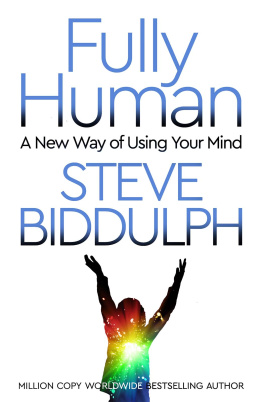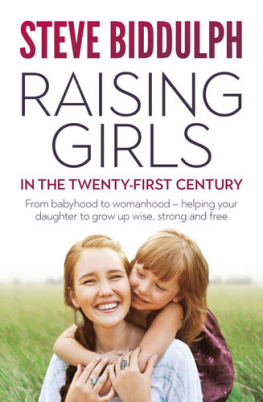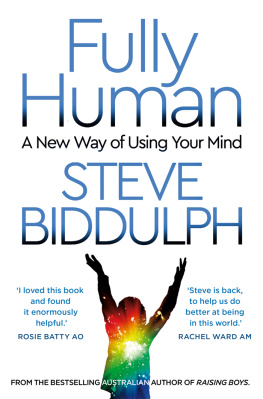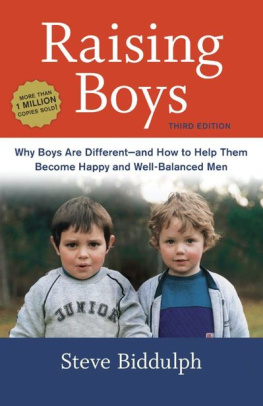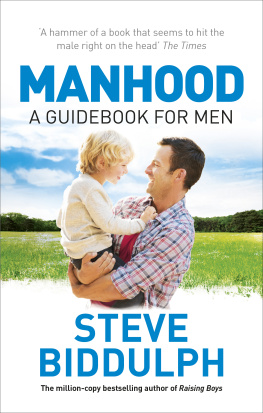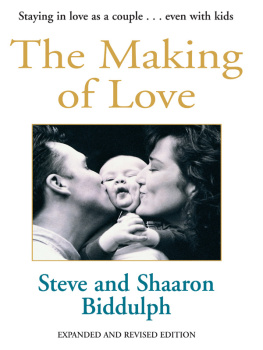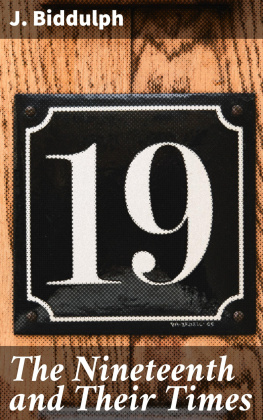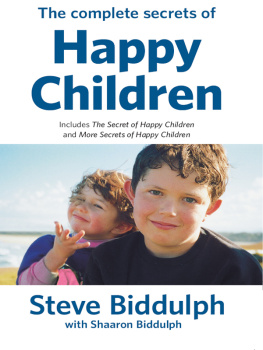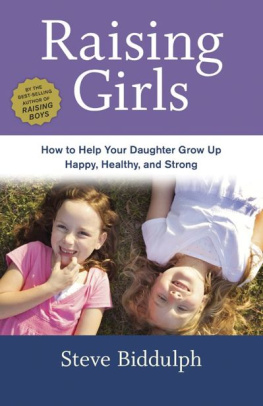Steve Biddulph - Fully Human
Here you can read online Steve Biddulph - Fully Human full text of the book (entire story) in english for free. Download pdf and epub, get meaning, cover and reviews about this ebook. year: 2021, publisher: Pan Macmillan, genre: Religion. Description of the work, (preface) as well as reviews are available. Best literature library LitArk.com created for fans of good reading and offers a wide selection of genres:
Romance novel
Science fiction
Adventure
Detective
Science
History
Home and family
Prose
Art
Politics
Computer
Non-fiction
Religion
Business
Children
Humor
Choose a favorite category and find really read worthwhile books. Enjoy immersion in the world of imagination, feel the emotions of the characters or learn something new for yourself, make an fascinating discovery.
- Book:Fully Human
- Author:
- Publisher:Pan Macmillan
- Genre:
- Year:2021
- Rating:5 / 5
- Favourites:Add to favourites
- Your mark:
- 100
- 1
- 2
- 3
- 4
- 5
Fully Human: summary, description and annotation
We offer to read an annotation, description, summary or preface (depends on what the author of the book "Fully Human" wrote himself). If you haven't found the necessary information about the book — write in the comments, we will try to find it.
Fully Human — read online for free the complete book (whole text) full work
Below is the text of the book, divided by pages. System saving the place of the last page read, allows you to conveniently read the book "Fully Human" online for free, without having to search again every time where you left off. Put a bookmark, and you can go to the page where you finished reading at any time.
Font size:
Interval:
Bookmark:

First of all, to Carole Tonkinson, publisher at Bluebird Books, who was almost a co-author of the work. Carole knows this subject deeply and understood the scope of what was being attempted. She never hurried me. And, in an elegant cafe in London, she spoke those words all authors long to hear: Write what you want!
Shaaron Biddulph weaves inextricably through everything I do. She has stuck with me since the very start, and both embodies and encourages full humanness. God bless you, Shaaron.
Sean Doyle of Lynk Manuscript Services wrangled the structure early on and is also a long-term student of spirituality and human growth. The book is lighter and clearer from his help, and his encouragement.
Alison Howard, Di Davies, Neil Shillito and Dean Yates read early versions and gave great help from their own deep thinking about life and suffering, joy and growth.
Ari Biddulph provided rapid and sharply evaluated research, across diverse fields of knowledge, with humour and perceptive commentary added. She is also a very inspiring and courageous human being.
Hockley Spare was a careful and supportive editor, who it was a joy to work with. Ingrid Ohlsson is my energetic Australian publisher at Pan Macmillan. People working in printing factories, paper recyclers, truck drivers, accountants, publicists and booksellers are usually overlooked, but not by me. Thank you for making all books possible.
Lyn Edwards got my body straight and added years to my life. I cant overstate the importance of this.
Helen Cushing taught me about the three states of mind, and a lot about meditation. Eric Harrisons books really helped too.
I have never met Helen Garner, but her storytelling, by its crispness, compassion and ability to never take comfort in judgmentalness, has influenced every Australian writer worth their salt.
For forty years, I followed my dimly felt supersense that something was missing from human psychology, and from the Western view of the mind. When I finally found that waterhole in the desert, the spirit of Eugene Gendlin was sitting there with his warm eyes and sharp intelligence. So, thank you to him, and the whole tradition of humanistic, caring, relational psychology, which is once again rising up to save us from the machinery of doom.

When you first begin to read a book, a quiet process starts to happen in your mind. Part of your brain tries to imagine the author, to suss them out. Are they someone wise enough to learn from? Are they well motivated and genuine, or just out to make a quid? A book is a kind of conversation, and you want to know who you are talking to. So here goes...
Im a husband, dad and grandad. For many years, I worked around the world, but my home is a small community on the island of Tasmania. To a British reader, Tassie, as we call it, is rather like living in the 1950s, but with feminism and the Internet so a pretty good place! Its quiet and slow, and so am I. Im grateful to live where I can swim in the ocean and be out under big skies.
I was a psychologist for over forty years, working with people in sometimes terrible circumstances. The main thing I have taken from this work is admiration for my fellow human beings, seeing them overcome trauma and suffering, and still be kind-hearted and not give up.
It caused some waves, but this is the task of old people. You have to live your values.
There is something else you should know. Several decades ago, I was talking with a psychiatrist friend over lunch. Mid-conversation, he asked me a series of questions. Then a concerned look appeared on his face. You do know, dont you? , he said. Youve got Aspergers? And a silent avalanche began to swoop down through my memory banks.
Back in my 1950s childhood on the windy Yorkshire coast, this was a condition that nobody knew about. I just thought I was shy! As a little five-year-old boy, on my first day of school, I decided education wasnt for me, and I walked out of the school gate and went home. The look on my mothers face as I waltzed in the door was something to see.
Little boyhood is not that complicated playing, shouting and running about and I loved my life, back then. But, in the teenage years social skills mattered more, and I just couldnt get it right with people. I could see everyone doing this thing called conversation, and it looked like fun. At this age, the girls at school were like goddesses a smile from one of them could really light up your day. But every attempt to connect with them just went astray. (Later, when girls did seem to like me, I just couldnt read their signals, and some very nice girls went unkissed!)
Life could have gone badly for me, as many young mens lives do, but for two things: I was raised by kind and loving if somewhat bewildered parents, and I had some exceptional teachers, youth workers and others who saw that I had a good heart, and they did their best to include me. When I looked like I was becoming homeless, they found me somewhere to live, and then later found me a job working, incredibly, with troubled kids! Inspired by that, I returned to my studies and became a psychologist. If you, dear reader, are a teacher or social worker who cares for young people who dont fit in, then you are my people.
Psychology is a good career if you cant relate to human beings. Over time, I finally learned what most people just instinctively seemed to know: that conversation follows rules like ping-pong or tennis, it goes to and fro. You say something, and then you wait for the other person to say something back. I hadnt known that! (Aspie people often sense a gap coming in the conversation, feel terrified, and then talk and talk and talk to fill it up.) And there are things called emotions they show on peoples faces and give you information about the state they are in, and how you might want to respond. (Its not only autistic people who have trouble with this.)
I knew that I had to learn and learn fast, because every day in our waiting room were families in real pain, and kids whose lives were not headed for good places. I sought out the very best people, in the therapy world, and while my friends were buying houses and cars, I travelled repeatedly across the globe to sit at the feet of the masters. I found that I could take into my own sinews and bones and brain the attitudes and ways of being with people of these superb human beings. I didnt even understand it, but I could do it.
Finding the missing pieces of how to be fully human seemed to unleash something in me. Please dont hear this as boasting I take little credit for this but today I can stand in front of a thousand people in an auditorium and hold them spellbound, and in fact that became my primary work. The half-dozen books I have written are in four million homes, and people seem to love them. I have travelled from being a lonely outsider to someone rather capable (though only in parts of my life, others are still quite hard).
I was convinced that people should not have to wait until they were in real pain, that much of what we were learning with families could be taught before marriages imploded or kids went off the rails.
The combination of writing and doing live presentations took me to so many countries and I met people in so many cultures, from hunter-gatherers to billionaire urbanites, in the worst of tragedies and to the most inspiring achievers. The topics I was interested in could be related to by everyone. I loved to listen and learn. I was the very opposite of an expert. And so real connection could be made. I had a recurring problem with taxi drivers bursting into tears!
Font size:
Interval:
Bookmark:
Similar books «Fully Human»
Look at similar books to Fully Human. We have selected literature similar in name and meaning in the hope of providing readers with more options to find new, interesting, not yet read works.
Discussion, reviews of the book Fully Human and just readers' own opinions. Leave your comments, write what you think about the work, its meaning or the main characters. Specify what exactly you liked and what you didn't like, and why you think so.

